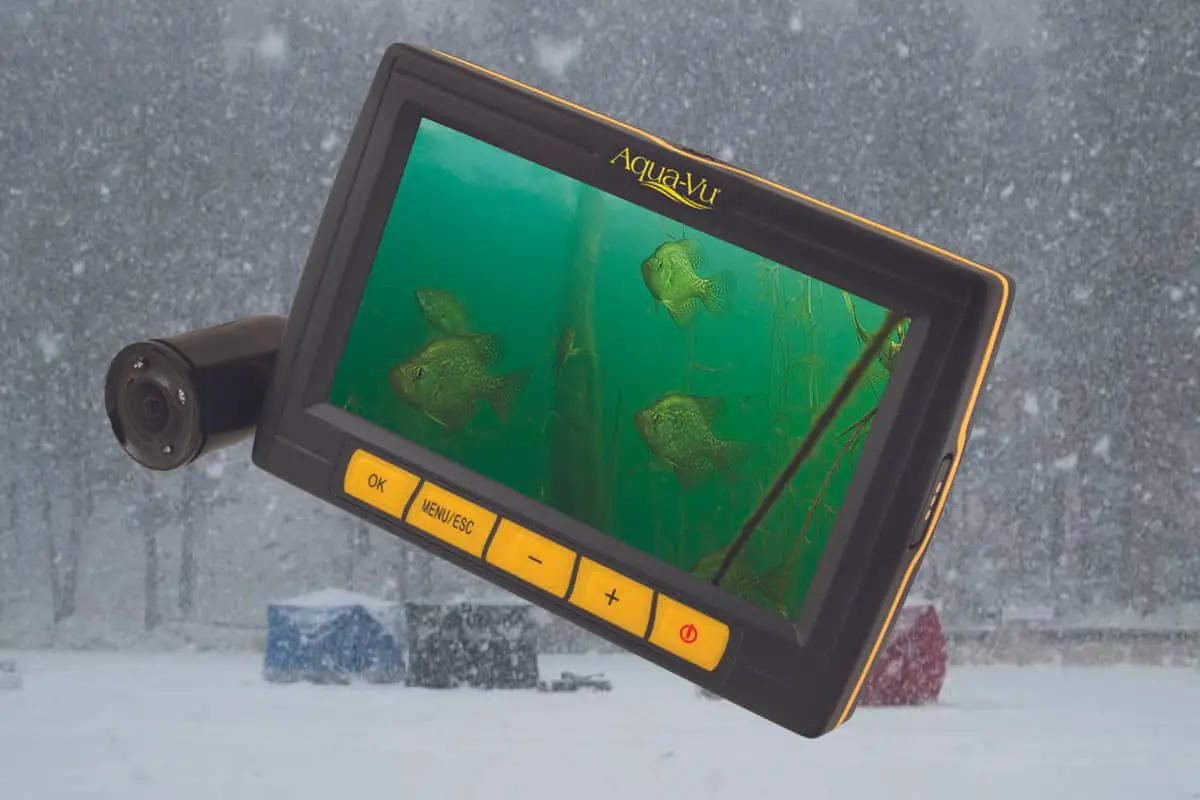About five or six years ago, I decided to purchase an underwater camera for ice fishing. A small pocket-sized camera has been a great addition to helping me find fish and locate structure that holds fish. Here’s what I’ve found on cameras scaring fish.
In general, ice fishing cameras will not scare fish away. Fish sense movement in the water, and larger cameras lowered quickly into the water will spook fish away. If lowered slowly, fish will tend to remain close by. Smaller cameras have high-quality definition and do not scare away nearby fish.
Several things concerning cameras come into play. It all depends on how you like to ice fish and how much gear you want to carry with you. Below are some of the factors you will need to consider.
What Scares Fish Away From Your Camera
Fish sense nearby danger with their lateral lines that detect the slightest movement in the water. Most fish except the top predators will have other fish preying upon them.
A large object coming toward them at a fast pace will have them vanish and hide quickly. Some may return, while others may move on to quieter feeding and resting areas.
The more curious fish will come in and give your camera rig a look too! Schooling fish seem not to be as spooked, while other fish like walleye tend to be a bit leery and not come in as fast.
“Sunfish, crappies, perch and notherns it doesn’t seem to bother and sometimes actually seems to attract them. Walleyes I’m convinced on the other hand seem to shy away from cameras, I’ll see them swim by but only rarely see them bite.”
Another factor you will want to consider is the species of fish you are targeting. If it’s schooling perch on a crowded lake won’t spook as quickly as smaller wary brook trout will in a shallow isolated lake.
Some species of fish are leerier than others by nature and will be scared away from anything dropping into their environment – cameras included.
Choose an Underwater Fishing Camera That Won’t Scare Fish
How you like to fish is also a major consideration. Many fishermen like choosing a spot and making camp for the day. At the same time, others are constantly on the move. The consideration between a large or small camera is contingent upon this.
Taking the price out of the issue, I would go for a smaller camera to spook fish the least.
When To Choose a Larger Underwater Camera
If you enjoy setting up a nice popup or permanent shelter and spending the day relaxing and cooking a little lunch when you are hungry, then a larger camera is probably best for you.
Drill your holes and slowly lower the unit down into the water, where it will remain for most of the day. There will be times fish eventually come in to check it out or even use it as cover like a dock post to swim near.
With the larger camera and remaining in one spot, you will have less chance of spooking fish every time you change locations. Plus, the larger camera requires a larger base unit, and you’ll have a larger screen as well. All this creates more weight to transport.
The best thing about the larger camera is they are easier to view and shows a much larger field than a smaller camera. If you’re in a spot for any length of time, the fish will get used to it hanging in their area, and you should be fine.
When To Choose a Smaller Underwater Camera
Five or six years back, I decided to go with a small handheld underwater camera for ice fishing. I like to be on the move, always checking new spots and moving from location to location chasing down aggressive fish.
I bought a used Aqua Vu Micro for $100.00 on Facebook Marketplace, and it has been the second-best electronic investment I have made! (The first one is my Vexilar Flasher unit!)
“While you can use them to fish with, they are more for scouting around checking holes and bottom content. The field of view is large and they sure are small and easy to bring with. If you want a camera to look at all day and fish with, a full size is a better choice.”
This unit is a little larger than a smartphone, comes with a fifty-foot length of cord so I can get pretty deep views. The lens is about the size of a golf ball, and the best part is the camera fits into my coat pocket!
Pro Tip: A small hand-held camera is worth its weight in gold. Take a look at the Aqua Vu Micro Stealth. Check the current price.
With such a small camera head, it slides down into the depths with very little water disturbance. With such a small presence in the water, fish aren’t as concerned with it.
Moving from spot to spot on a lake, I want to disturb fish as little as possible, and the smaller camera works great for this. Not only are the smaller cameras extremely portable they are easier to use.
I can watch fish and how they react to my lures or use a smaller camera to view transitional areas on the bottom.
The smaller camera shines at locating where weed lines begin and end. I can also spot fish holding on a small rocky area my flasher doesn’t detect well.
Do Underwater Cameras Lights Scare Fish
Underwater camera lights can scare fish when you suddenly turn them on, and fish are nearby. The sudden change in light interacts with their vision, and they disperse for safety. Once the lights are on, they will attract zooplankton and small baitfish, which will bring in the larger fish.
Overall, any sudden movement or drastic light changes will send fish scurrying in a flash due to their preservation instincts. Infrared( IR) lights don’t seem to bother fish much, and once any lights are on, fish become accustomed to them.
Are Underwater Cameras Worth It for Ice Fishing
Underwater cameras are worth using when you enjoy watching fish interact with your baits. Seeing how fish respond to your presentations can land you more catches. The smaller units are worth having with you when you check for isolated underwater areas that may hold fish.
Whether you like being “on the move,” searching for aggressively feeding fish (small camera), or setting up and enjoying a day of fishing in one spot (larger camera), I’d recommend considering a camera to your ice fishing arsenal!
Is a Sonar or Camera Better for Ice Fishing
A sonar (flasher) unit is superior to a camera in most cases. A sonar unit will allow you to ping (detect) fish far deeper than a camera’s range will allow. In shallow waters, a camera is often a better choice than sonar. Overall, sonar will outperform a camera on the majority of fishing excursions.
My flasher can detect fish down to well over 120′ when fishing for lake trout. And the transducer cone allows a wide detection range.
In shallow water, the camera is often better (as long as the water isn’t murky) for viewing fish and watching for bites. While a sonar unit in shallow water only detects fish in a smaller area.
Final Thoughts
An underwater camera generally doesn’t scare away fish when handled and lowered properly. Any lights suddenly turned on may spook fish for a brief time, but soon after, they generally return.
Between the two, I chose a high-quality flasher and coupled it with the Aqua Vu Micro camera for spot-checking when needed. Plus, when kids become bored (and they do!) when you take them ice fishing, they love to watch the perch swimming around!
Have fun and stay safe out there!

